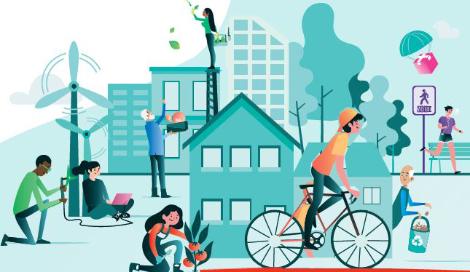Tomorrow my territory 14 Delivering cleaner
Urban logistics
November 2019
Agence pour l’Environnement et la Maîtrise de l’Energie (ADEME)
The 20 factsheets in the collection « demain MON TERRITOIRE » have been designed to give candidates and elected officials practical keys to take action, to open up the field of possibilities based on the experiences of other elected officials, from small towns to conurbations, large urban areas or sparsely populated areas. In the four corners of France, both in metropolitan France and in the French Overseas Territories, many of them are taking action, together with the players in their territories, to prepare for the future by taking action to mitigate climate change and adapt to its effects. With its knowledge and presence throughout the country, ADEME supports them with its tools, activities and financial aid.

Why is it important to improve the transportation of goods in my territory?
Whether delivering to businesses or private individuals, delivery has become a central element in the organisation of transport. A source of ease and time saving for private individuals or synonymous with space saving for shopkeepers who can reduce stocks, it contributes to the dynamism and vitality of my territory but also has important negative consequences: air pollution, greenhouse gas emissions, fossil fuel consumption, noise, accidents, street congestion, etc. The development of new modes of consumption, particularly e-commerce, leads to an inflation of the flow of goods, and therefore of transport. We need to rethink this central activity in the heart of a city, reduce its impact on the environment and health, and improve the living environment of city dwellers. Because they can propose a different regulatory framework for traffic in cities and support the creation of appropriate logistics infrastructure, municipalities must take up the issue of deliveries.
How do you do it?
-
Beforehand, an inventory of fixtures is carried out. Mapping the flow of goods - quantity, nature, type of vehicles used, professionals concerned - is necessary for a good understanding of the subject on its territory. A consultation is carried out with the various players: transporters, shipper customers, traders and citizens.
-
Access to the city centre and parking management are two interesting prerogatives of the territories to change the situation. Deliveries are limited to peak hours or encouraged early in the morning or late at night in silent mode. Areas are reserved for unloading goods at certain times of the day, and open to individuals the rest of the time.
-
Alternative transportation practices, such as cargo bikes, scooters, electric tricycles, are encouraged. Companies are made aware of the « last kilometre » issue and are strongly encouraged to use low-emission vehicles: dedicated timetables, priority parking spaces, the possibility of using reserved lanes, etc.
-
How about experimenting with scooter delivery? Or consider using the waterway that runs through my community? Or take an old railway line? Or dedicate a part of a tramway train outside peak hours to transport parcels from the outskirts to the city centre?
-
We support the creation of urban distribution centres on industrial wasteland, near railway stations, in underground car parks as soon as they are built, etc. by mobilising land. The goal? To allow « classic » transporters to get close to the heart of the city without entering it. We then promote the emergence of a clean delivery system on the « last mile ».
A charter to take your first steps in sustainable urban logistics
The national framework for voluntary charters for sustainable urban logistics is piloted by ADEME and the Ministry of Ecological and Solidarity Transition. The charter is a methodology, supplemented by a « toolbox » for local authorities. The approach enables them to support them in the construction of a programme of actions to organise the mobility of goods on their territory.